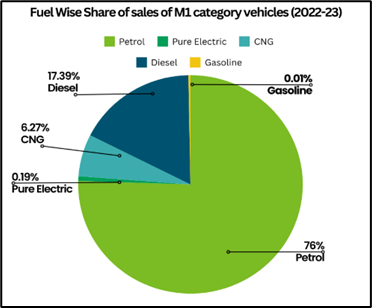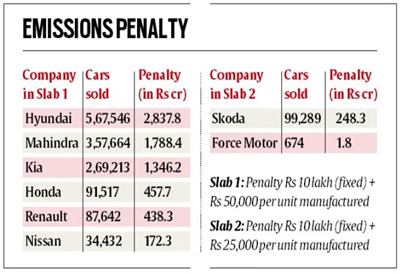Why in News?
The Centre has identified eight automakers, including Hyundai, Kia, Mahindra, and Honda, for exceeding mandated fleet emission levels during the financial year 2022-23.
Non-compliance with Corporate Average Fuel Efficiency (CAFE) norms has led to an estimated penalty of ₹7,300 crore, with Hyundai alone facing over ₹2,800 crore in fines.
What’s in Today’s Article?
- What are CAFE Norms?
- Penalty on Automakers for Violating CAFE Norms
- Conclusion
What are CAFE Norms?
- Introduced by: The Bureau of Energy Efficiency (BEE) in 2017 under the Energy Conservation Act, 2001, to regulate fuel consumption and carbon emissions for passenger vehicles.
- Objective: Reduce oil dependency and curb air pollution.
- Scope: Vehicles under 3,500 kg, including those powered by petrol, diesel, LPG, CNG, hybrids, and EVs.

- Implementation: These standards were introduced in two phases - the first CAFÉ norms stage I fuel consumption standards were introduced effective 2017-18, and the CAFÉ norms stage II standards came into force in 2022-23.
- Compliance Criteria for FY23:
- Fuel consumption: ≤ 4.78 litres per 100 km.
- Carbon emissions: ≤ 113 grams of CO2 per km.
- Penalties for non-compliance: The financial year 2022-23 saw tighter CAFE norms come into effect, resulting in significant penalties for non-compliance.
- Significance of CAFE norms:
- The CAFE framework incentivises automakers to produce EVs, hybrids, and CNG vehicles while penalising reliance on fossil fuel-driven cars.
- Stricter norms align with India’s broader goals to reduce emissions and promote sustainable transportation.
Penalty on Automakers for Violating CAFE Norms:
- Breakdown of penalty: The penalties represent a substantial proportion of some automakers' profits, with Hyundai's fine equating to nearly 60% of its FY23 earnings.
- Stricter penalty norms:
- In December 2022, the Energy Conservation Act was amended to enforce stricter penalties:
- ₹25,000 per vehicle for a shortfall below 0.2 litres per 100 km.
- ₹50,000 per vehicle for exceeding the threshold.
- Base penalty: ₹10 lakh.
- Carmakers’ contentions: Automakers argue that the stricter penalty norms took effect only from January 1, 2023, making it unfair to apply them retroactively to cars sold throughout FY23.
- Government’s counter:
- In FY23, 18 manufacturers’ models were tested in accredited laboratories to simulate real-world driving conditions.
- While all 19 automakers complied in FY22, data for FY23 indicates non-compliance for eight carmakers.
Conclusion:
- The penalties for non-compliance with CAFE norms underscore the government's commitment to enforcing stricter emission standards.
- However, ongoing discussions and delayed compliance reports highlight the challenges in balancing regulatory enforcement with industry concerns.











